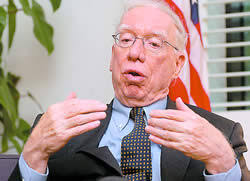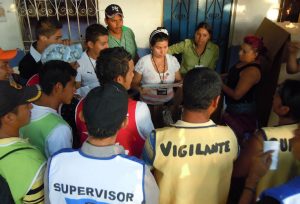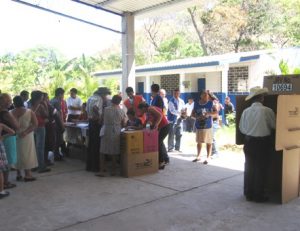Education, Historical Memory, International Meddling, Politics
U.S. and the 2009 Salvadoran Elections, August, 2008
U.S Intervention in the 2009 Salvadoran Elections: Will history repeat itself?
August, 2008
As El Salvador prepares for the March 2009 presidential elections, memories of U.S. intervention in the country have not been forgotten. From the hundreds of millions of dollars that the Reagan administration sent to the Salvadoran military to suppress the guerrilla forces during the Civil War of the 1980s, to the recent confession from the U.S. ambassador to El Salvador that the U.S. intervened in the 2004 elections, the U.S. has had a constant role in the internal affairs of the El Salvador.
As Latin America moves rapidly toward the left, El Salvador may be the next country to elect a leftist government. Right now, polls show that the left wing Farabundi Marti Liberation Front (FMLN) candidate Mauricio Funes is consistently leading Rodrigo Avila, the rightwing Nationalist Republican Alliance (ARENA) candidate, at times by as much as 15 percent.
After 16 years of control by the pro-U.S. ARENA party, the possibility that the left might win in El Salvador excites many and also highlights the rapidly declining support for the U.S. government in Latin America. El Salvador has become the strategic centre for U.S. operations in Central America. It is home to a regional FBI office, will be the location of the International Law Enforcement Agency (ILEA), a U.S. training facility for police officers from all over the region, and is the only Latin American country with troops in Iraq. The loss of ARENA could put these U.S. operations in El Salvador at risk.
The 2004 Elections
Recently, both U.S. Ambassador to El Salvador, Charles Glazer, and U.S. Deputy Secretary of State, John Negroponte, promised no U.S. intervention in El Salvador’s 2009 elections. Given the history, this commitment lacks credibility. Looking back at the 2004 presidential elections in El Salvador, the evidence of U.S. intervention is clear.
In 2004, the then U.S. Ambassador Douglas Barclay promised that there would be no U.S. intervention in the elections. However, as the presidential race intensified in El Salvador, a number of U.S. State Department officials and Congressional Representatives made public statements claiming that if the FMLN were to win the presidency, U.S. development assistance to El Salvador, the flow of remittances from El Salvador to the U.S., and the wellbeing of Salvadoran immigrants in the U.S. would all be at risk.
Otto Reich, the Special Envoy to the Western Hemisphere for the White House, commented at a phone-in press conference at the ARENA headquarters:
“We are concerned about the impact that an FMLN victory could have on the commercial, economic and migration-related relations of the U.S. with El Salvador”
Thomas Tancredo, U.S. Congressman from Colorado said:
“If the FMLN controls the Salvadoran government after the March 2004 Presidential Elections, it could mean a radical change in U.S. policy regarding the essentially free flow of remittances from Salvadorans living in the U.S. to El Salvador”.
Although the statements of a few Congressional Representatives might have little impact within the complex sphere of U.S. immigration policy, when the message was publicized by El Salvador’s mass media, fear grew exponentially within the population. As remittances represent more than 17% of El Salvador’s GDP, a potential change in U.S. immigration policy threatens the livelihood of millions of Salvadorans.
Rosa Valle, the Vice-president of the Association for Rural Development in El Salvador CRIPDES, spoke about the atmosphere before the 2004 elections saying,
“The comments from the US Congressional Representatives were a strategy to create fear in the population. Many people feared that their family members in the US would be deported and that they would lose their livelihoods. This affected the mentality in which voters saw their choice in the election”.
To respond to the damaging Congressional comments, 28 Congressional Representatives wrote a letter of protest and held a number of press conferences to spread the message that the comments about changes in policy toward El Salvador were both irresponsible and false. This information, however, was not printed in the mainstream media in El Salvador and did not reach the majority of Salvadorans.
Ambassador Barclay himself, after promising that there would be no U.S. Intervention, responded to the situation by saying that, “Congresspeople can say what they want when they are here (in El Salvador)”.
Only after the ARENA party candidate won the presidential election did the Ambassador say: “The U.S. Government has nothing to do with remittances… Regarding the migration situation, U.S. Law is determined by the U.S. Congress… and it would be speculation that a law would be changed because of the results of an election“.
Looking to the 2009 Election
U.S. officials have started to make public comments to defame the FMLN even before El Salvador’s presidential campaign has officially started.
In February, 2008, the U.S. Director of National Intelligence, Michael McConnell, notified congress that he believed that Mauricio Funes, the FMLN candidate, would receive ¨generous campaign funding¨ from Hugo Chavez during the campaign. This claim has been denied by all involved and Funes, who represents a moderate sector of the left, responded by saying that his priority would be in creating a cordial relationship with the U.S.
In July, ARENA´s presidential candidate Rodrigo Avila travelled to the U.S. to meet with a number of congressmen. As part of his campaign platform, he has promised to strengthen the Temporary Protective Status, TPS, for Salvadoran immigrants in the U.S. It now seems likely that, as a result of this meeting, one or two Congressional Representatives will make statements against the FMLN regarding TPS as occurred in the 2004 elections.
U.S. intervention in the 2006 Nicaraguan presidential election is a further cause for alarm. In April 2006, the United States government offered to fund primary elections for the opposition parties to Daniel Ortega. A few Congressional Representatives also warned that remittances would be cut if Daniel Ortega became president. The intervention was to such an extent that the Organization of American States reprimanded the conduct of the Congressional Representative’s actions.
As we look into the future, it appears that the U.S. does not want to lose the strategic alliance with the ARENA government, especially as the Left strengthens in Latin America. The U.S. government intervened in El Salvador all throughout the Civil War in the 1980s, during the 2004 election campaign, in the Nicaraguan elections in 2006. The most recent comments by U.S. politicians defaming the FMLN should be a cause for worry in the coming months
The stage is set for a new phase of U.S. government intervention in El Salvadoran elections. Citizens and organizations in the U.S. and El Salvador must come together to denounce U.S. intervention and advocate for a truly free and democratic process.
“The election of the next president of El Salvador must be the decision of the people and not the result of outside intervention. U.S. and Salvadoran citizens alike must oppose any intervention in this election. We must work together to ensure a truly democratic electoral process in this country“, said Rosa Valle of CRIPDES.



